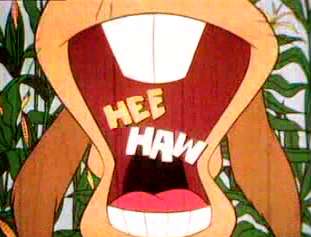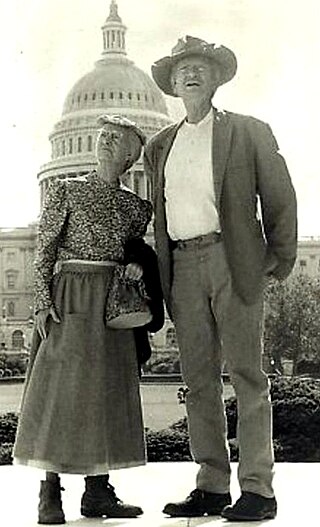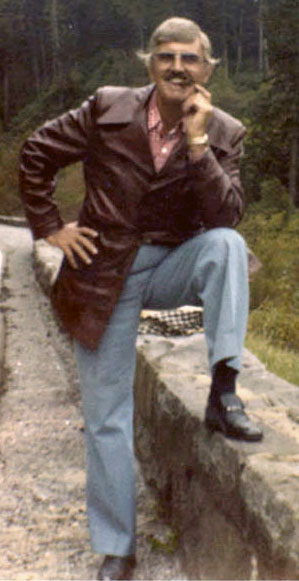Related Research Articles

Hee Haw is an American television variety show featuring country music and humor with the fictional rural "Kornfield Kounty" as the backdrop. It aired from 1969 to 1993, and on TNN from 1996 to 1997. Reruns of the series were broadcast on RFD-TV from September 2008 to April 2020, and aired on Circle.
Lawrence Welk was an American accordionist, bandleader, and television impresario, who hosted The Lawrence Welk Show from 1951 to 1982. His style came to be known as "champagne music" to his radio, television, and live-performance audiences.
The year 1971 involved some significant events in television. Below is a list of notable TV-related events.
The year 1972 involved some significant events in television. Below is a list of notable television-related events.
Variety show, also known as variety arts or variety entertainment, is entertainment made up of a variety of acts including musical performances, sketch comedy, magic, acrobatics, juggling, and ventriloquism. It is normally introduced by a compère or host. The variety format made its way from the Victorian era stage in Britain and America to radio and then television. Variety shows were a staple of English language television from the late 1940s into the 1980s.
Broadcast syndication is the practice of content owners leasing the right to broadcast television shows and radio programs to multiple television stations and radio stations, without going through a broadcast network. It is common in the United States where broadcast programming is scheduled by television networks with local independent affiliates. Syndication is less widespread in the rest of the world, as most countries have centralized networks or television stations without local affiliates. Shows can be syndicated internationally, although this is less common.

Mayberry R.F.D. is an American television series produced as a spin-off continuation of The Andy Griffith Show. When star Andy Griffith decided to leave his series, most of the supporting characters returned for the retitled program, which ran for three seasons on the CBS Television Network from 1968 to 1971.

The Lawrence Welk Show is an American televised musical variety show hosted by big band leader Lawrence Welk. The series aired locally in Los Angeles for four years, from 1951 to 1955, then nationally for another 16 years on ABC from 1955 to 1971, followed by 11 years in first-run syndication from 1971 to 1982. Repeat episodes are broadcast in the United States by Public Broadcasting Service (PBS) stations. These airings incorporate an original program—usually, a color broadcast from 1965 to 1982—in its entirety. In place of the commercials, newer performance and interview clips from the original stars and/or a family member of the performers are included; these clips are occasionally updated.

Roy Linwood Clark was an American singer, musician, and television presenter. He is best known for having hosted Hee Haw, a nationally televised country variety show, from 1969 to 1997. Clark was an important and influential figure in country music, both as a performer and in helping to popularize the genre.

Maxwell Emmett "Pat" Buttram was an American character actor. Buttram was known for playing the sidekick of Gene Autry and for playing the character of Mr. Haney in the television series Green Acres. He had a distinctive voice that, in his own words, "never quite made it through puberty."

The "rural purge" of American television networks was a series of cancellations in the early 1970s of still-popular rural-themed shows with demographically skewed audiences, the majority of which occurred at the end of the 1970–71 television season. In addition to rural-themed shows such as Mayberry R.F.D., The Beverly Hillbillies, Petticoat Junction, and Green Acres, the cancellations ended several highly rated variety shows that had been on CBS since the beginning of television broadcasting. CBS saw a dramatic change in direction with the shift, moving away from shows with rural themes and toward more appeal to urban and suburban audiences.
Christian country music is music that is written to express either personal or a communal belief regarding Christian life, as well as to give a Christian alternative to mainstream secular music. Christian country music is a form of Christian music and a subgenre of both Gospel music and Country music.
This is a list of notable events in country music that took place in the year 1973.
This is a list of notable events in country music that took place in the year 1971.

Archie Campbell was an American comedian, writer, and star of Hee Haw, a country-flavored network television variety show. He was also a recording artist with several hits for RCA Victor in the 1960s.

The Aldridge Sisters, Sheila and Sherry Aldridge, are an American singing act that appeared on The Lawrence Welk Show from 1977 to 1982.
The Prime Time Access Rule (PTAR) was an American television broadcasting regulation enforced by the Federal Communications Commission (FCC) from September 13, 1971, to August 30, 1996. It was instituted under concerns that television networks controlled too much of their affiliates' programming, and that there was not enough competition in program production and distribution. Under the regulation, commercial television networks were prohibited from airing programming in the 7:30 p.m. ET/PT half-hour on weekdays and Saturdays, and the 7:00 p.m. and 10:30 p.m. ET/PT half-hours on Sundays, on stations in the top 50 media markets. Despite only applying in the largest markets, the PTAR was practiced nationwide.

John Bansley Aylesworth was a Canadian television writer, producer, comedian, and actor, best known as co-creator of the American country music television variety show Hee Haw, which appeared on network television for two years and then ran for decades in first-run syndication.

Peppiatt and Aylesworth were a Canadian television comedy team. The team consisted of Frank Peppiatt and John Aylesworth.

George Vaughn Horton was an American songwriter and performer. Usually credited as "Vaughn Horton" or "George Vaughn", he wrote or contributed to the success of a number of popular songs, including "Choo Choo Ch'Boogie", "Hillbilly Fever", "Sugar-Foot Rag", "Mockin' Bird Hill" and the Christmas song "Jolly Old Saint Nicholas".
References
- Whitburn, Joel, "Top Country Songs: 1944-2005," 2006.
- Allmusic — Thank God and Greyhound by Roy Clark.